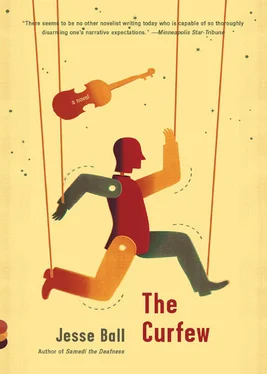— Do you remember the time we went boating, you and Louisa, Ana and I?
William nodded.
— Do you remember when that man asked to take a picture of us, and Louisa didn’t want him to? The man on the pier?
— I do.
— And then he took the picture anyway, and Louisa got angry, but we were already out in the current, and we didn’t want to turn back. I sometimes think …
Gerard had taken the bottle with him. He took a swig from it.
— I sometimes think if we had gone back, then, everything would have changed, and she wouldn’t have been shot.
William’s mouth was dry. The idea of Louisa was all close spaces, distances, thick smells. It was inaccessible like the inside of a stone.
— What is the method? he asked.
— The method for disgovernance. Other revolutionary movements fail when they are found out. This one just begins when it is found out. It is impossible to stop because there are no ringleaders. It is simple enough to describe in a phrase or two the whole extent of it. Any member of the government, any member of the police, of the secret police, all are targets. You live your life, and do nothing out of the ordinary. But if, at some moment, you find yourself in a position to harm one of the targets, you do. Then you continue on as if nothing has happened. You never go out of your way to make such an opportunity come to pass. Not even one step out of your way. And yet, without exception, the targets must each day place themselves in danger before the citizenry, and cause such opportunities to exist. One doesn’t prepare oneself, except mentally. One never speaks of it, except to spread the idea, and that is better done by sheets of paper left here and there.
Gerard was silent for a minute. He drummed his hand on the table. He took another sip of wine.
— The perfect crime consists of randomness: you happen to be passing a table on which a diamond necklace is lying; everyone has momentarily turned away; you snatch the necklace and continue; you are now the possessor of a diamond necklace. Having randomly arrived there, you had every reason to be in that place at that time, as part of your routine. You only ceased, in the moment of the crime, to be a thing apart from the background, and immediately thereafter, you returned to it. The only thing the New State can do is to clamp down tighter, and that only earns them more hate, activates more of the population. The method is reaching us here only now, but it has been around for two years. And a year ago, do you remember what happened?
— They disbanded the police. Now, only secret police.
— Exactly, and they never said why. But a man I spoke to …
The door opened and a woman stuck her head through.
— Gerard, can you come? I’m trying to convince Leonard that there’s a growing sentiment abroad, but I can’t remember all the figures.
— In a minute.
— All right.
She shut the door.
— This man said that they moved the police force entirely into plainclothes because in another sector, the police were getting mowed down. A policeman couldn’t walk down a street without being hit by a slate tile. First they tried making the police paramilitary, with jeeps, etc. But ultimately, to do the job, they have to get out of the jeeps, and then the same opportunities present themselves. It’s a matter of patience, and decisiveness. The point is, we’re winning. It’s only a matter of time.
— But how do you know who the police are?
William thought of his conversations with Oscar. It was virtually impossible to tell.
— You err on the side of false positives. Everyone shifts their behavior to simple routines, and the secret police are forced to become visible, simply to do their work. Then they become available as targets.
The ringing of a bell could be heard in the distance. The room had become very quiet. Gerard was looking at William and William, he was looking at Gerard. Louisa was not there, for she was dead, but in that way she was in fact there.
— Shall I say it? said Gerard.
William nodded.
— Someone I know, who was, well, he was working for the government then, before he came over. He saw what happened to her. I can’t relate it. I don’t want to. But I have everything about the file here.
He produced a folder from behind one of the boxes and handed it to William. It was tied around with string and was quite thick.
— I imagine you’ll want to look at that at home, or somewhere without company.
The door opened again.
— Gerard, will you come?
— All right, here I am. Hold on a moment.
He stood up.
— Well, that’s it, William. I wanted to show you something else, too, but I guess it can wait.
— What is it?
The girl pulled on Gerard’s arm.
— Hold on, he said.
He knelt down and opened a cabinet that was on floor level. Out of it, he removed a flat black leather case. He set it down.
William could feel his pulse in his hands.
Gerard unfastened two buckles and opened the case.
It was a violin.
— Where did you get it?
— Can’t say.
William looked at the girl.
— Don’t worry about me, she said. I’m the one who got it.
— It’s for you, William, said Gerard. You should probably go home now. Having you here, it’s out of the routine, and a danger for both of us. You have a safe route home? You planned it, no?
— I …
William looked away.
— Perhaps it’s best you stay, then. If you don’t have transportation, or a clear route. I thought you had, well, don’t worry about it. Just stay. If you don’t want to be among people, you can read upstairs in the bedroom, and leave first thing.
— I have to be home. My daughter, you see.
— I see.

William paused a moment on the stair.
In one hand he had the violin case, in the other the scrip of files.
Laughter came from within. William shook his head. The lights along the streets blinked on then off.

Gerard shut the door and watched the figure go away along the street, the black case apparent under his arm.
— Do you think he’ll …?
— He won’t play it, not ever. But at least he will have it.
— And for the rest?
— If he acts, if he doesn’t, it’s meaningless. The whole thing goes forward. No one is important. No one at all.
— A war with no participants. Only casualties. The forest opens and consumes the troops.
She laughed.
— And consumes the troops, agreed Gerard.
She came to the door and stood beside him looking out the window.
There was nothing to see.
— I have a terrible feeling, he said. Like the rope isn’t tied to anything.
— Come now, he’ll make it home. Come.
She kissed him and led him back to the others.

— And here, said Mr. Gibbons, is the brush I always use for eyes.
He handed Molly an extremely thin brush.
— It is not a-single-horse’s-hair, but it is close to that.
Molly wrote on the paper:
*Three horse hairs?
— Perhaps.
The brush had a furious red handle. Such a handle, it seemed that it would grant life to whatever it made. Molly gave it back to Mr. Gibbons reluctantly.
*But why a different brush for eyes? Is there one for mouths, for ears, for cheeks? Molly wrote.
Mr. Gibbons read the paper.
— You’re a shrewd one, he said. That’s for certain. Here’s why: if I have to switch brushes for each feature, it grants me the space of thought. I can’t just dash ’em off. Also, the brush can be acquainted with its specialty, if you believe such things.
Читать дальше













